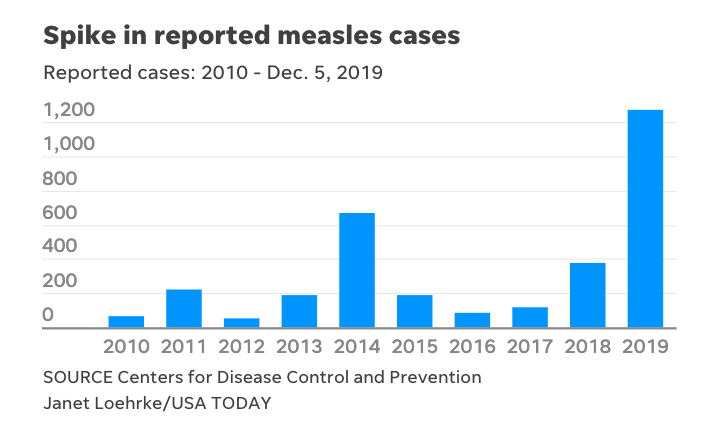This article appeared in USA Today. Read the full story here.
There have been 1,276 confirmed cases of measles in 31 states so far this year, the highest number in 25 years, according to the federal Centers for Disease Control and Prevention. It is more confirmed cases of measles than in the past four years combined.
Though the number of infections has decreased toward the end of the year, an unknown number of individuals have been exposed to measles after five U.S. airports confirmed that travelers with measles entered these airports.
The vast majority of measles cases in 2019 have been reported in unvaccinated people and children under age 18. No deaths have been reported.
Here’s everything you need to know about the scare and getting vaccinated.
What’s the latest today on measles in the U.S.?
Health officials in five U.S. cities – Los Angeles; Chicago; Denver; Austin, Texas; and Richmond, Virginia – confirmed that individuals infected with measles visited their airports, potentially infecting others traveling through these airports.
An individual with measles traveled through Chicago O’Hare International Airport twice in one week, confirmed the Chicago Department of Public Health.
The person contracted measles while traveling in Europe from late November to early December and became sick on Dec. 14, the Austin American-Statesman reported. The person developed a rash on Dec. 17, and boarded United Airlines Flight 790 that same day from Austin to Chicago with a connecting flight to Virginia. The same individual also traveled on Dec. 12.
On Dec. 11, per the Los Angeles County Department of Public Health, three unvaccinated children returning from a country with an ongoing measles outbreak traveled through two terminals in Los Angeles International Airport.
The three children then landed in Denver International Airport, where they went through Concourse A, baggage claim and passenger pick-up, according to Colorado’s Tri-County Health Department. They are currently hospitalized at Children’s Hospital Colorado.
Can you get measles if you are vaccinated?
Among the reported cases this year, some have been people who are fully or partially vaccinated, said Dr. Nancy Messonnier, director of the CDC’s national center for immunization and respiratory disease.
“In a setting where there is extreme disease pressure, we know there can be vaccine failure,” she said.
Two doses of measles vaccine are about 97% effective, and one dose is about 93% effective, according to the CDC.
Adults in high-risk settings, such as those traveling internationally, working in health care or living in communities with ongoing outbreaks should check their vaccine status or consult with a health-care professional, she said. All individuals who traveled through airports in Los Angeles, Chicago, Denver, Austin, Richmond in early December are also advised to do so.
Should I get another measles vaccine?
Most adults – including people who received a single dose or were born before the measles vaccine was recommended – are protected, Messonnier said.
CDC efforts are focused on those at higher risk: international travelers, health care workers, university students and people in communities where outbreaks are underway, she said. Those adults should have had two shots, separated by at least 28 days.
If you are unsure whether you’ve been vaccinated, check with your doctor. A blood test to check for measles antibodies can be done. There is no harm in getting another dose of the vaccine if you are already immune to measles, mumps and rubella.
How long does the measles vaccine last?
If you have had two measles shots, you are protected for a lifetime.
Individuals born between 1957 and 1989 should double-check their immunization records, as they likely only received one dose of the MMR vaccine. Guidelines by the CDC were updated in 1989 to two doses of the vaccine.
Who should be vaccinated?
Infants should get their first dose of the measles, mumps, rubella (MMR) vaccine between six and 11 months of age, if they are going to travel internationally, said Redfield, the CDC director. Infants who are not traveling should get two doses, starting at 12 months of age and separated by at least 28 days. The second dose is usually given between 4 and 6 years of age, and the CDC is not currently recommending that it be done earlier.
Adolescents and adults who have not had measles should have two doses, separated by at least 28 days.
Anyone traveling internationally should complete the vaccine schedule at least two weeks before departure. But if the departure is sooner, they should still get at least one dose of the vaccine, Redfield said.

